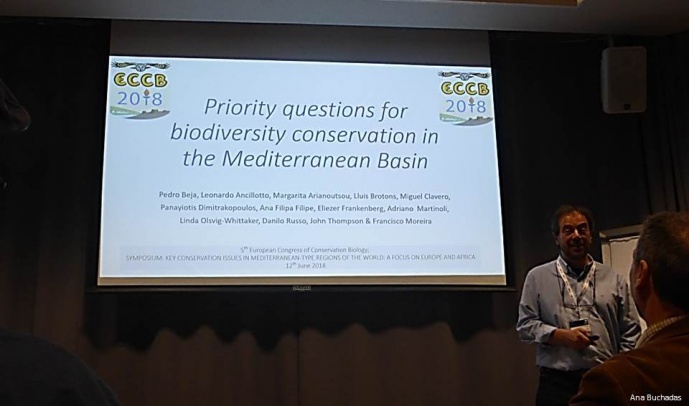CIBIO-InBIO RESEARCH HIGHLIGHTED IN THE 5TH EUROPEAN CONGRESS OF CONSERVATION BIOLOGY

Under the theme planetary wellbeing, ECCB 2018 provided a forum to discuss and develop solutions for some of the greatest challenges faced by humanity by bringing together natural and social scientists, practitioners, industry members and government decision-makers.
In this context, CIBIO-InBIO researchers organized two symposiums and contributed with poster and oral presentations.
Key conservation issues in Mediterranean-type regions
The session “Key conservation issues in Mediterranean-type regions of the world: a focus on Europe and North Africa” was led by Francisco Moreira and counted on eight oral presentations, four of which presented by CIBIO-InBIO researchers.
Francisco Moreira revealed the “Overall (first) results of the “100 questions for biodiversity conservation in Mediterranean-type regions of the world initiative”, a project which brings together a group of researchers from the five Mediterranean-type ecosystems regions of the world. In the scope of the same project, Pedro Beja talked about “Priority questions for biodiversity conservation in the Mediterranean Basin”.
Afterwards, Angela Lomba presented the talk “Unravelling the importance of High Nature Value farmlands for biodiversity conservation and provision of ecosystem services in the Mediterranean regions” under the scope of the FARSYD project. Finally, under the scope of ENVMETAGEN project, Sónia Ferreira provided an overview on “DNA metabarcoding of hidden biodiversity in the Mediterranean Basin”, focusing on the potential of Metabarcoding as a tool to conservation research.
Infrastructure and conservation
CIBIO-InBIO researcher Fernando Ascensão hosted a session about “Infrastructure and conservation”, which included seven oral presentations, two of which were carried out by CIBIO-InBIO researchers.
Rafael Barrientos presented the talk “Where is Road Ecology going?”, where he suggested that Road Ecology needs to innovate in research topics, as several impacts remain understudied.
Fernando Ascensão closed the session with the presentation “Understanding animal-road interactions for proper mitigation: stopping the recurrent roadkill of Giant Anteaters” based on a recently initiated research project in Mato Grosso do Sul.
Within the framework of other thematic sessions Fernando Ascensão also provided an assessment of the potential for political European borders to function as key conservation and connectivity areas, and Ana Buchadas presented preliminary results of a study which assessed the dynamics of High Nature Value in the Portuguese agrarian region of Entre-Douro-e-Minho, for two-time periods – 1990 and 2010.
To know more about this event, please follow the links below:
“ECCB 2018 – Overall (first) results of the ‘100 questions for biodiversity conservation in Mediterranean-type regions of the world’ initiative” | June 12, 2018
“ECCB 2018 – Priority questions for biodiversity conservation in the Mediterranean Basin” | June 12, 2018
“ECCB 2018 – Unravelling the importance of High Nature Value farmlands for biodiversity conservation and provision of ecosystem services in the Mediterranean regions” | June 12, 2018
“ECCB 2018 – DNA metabarcoding of hidden biodiversity in the Mediterranean Basin” | June 12, 2018
“ECCB 2018 – Assessing the dynamics of High Nature Value farmlands in space and time” | June 13, 2018
“ECCB 2018 – Frontiers for conservation: targeting European borders as conservation areas" | June 14, 2018
“ECCB 2018 – Where is Road Ecology going?” | June 14, 2018
“ECCB 2018 – Understanding animal-road interactions for proper mitigation: stopping the recurrent roadkill of Giant Anteaters” | June 14, 2018